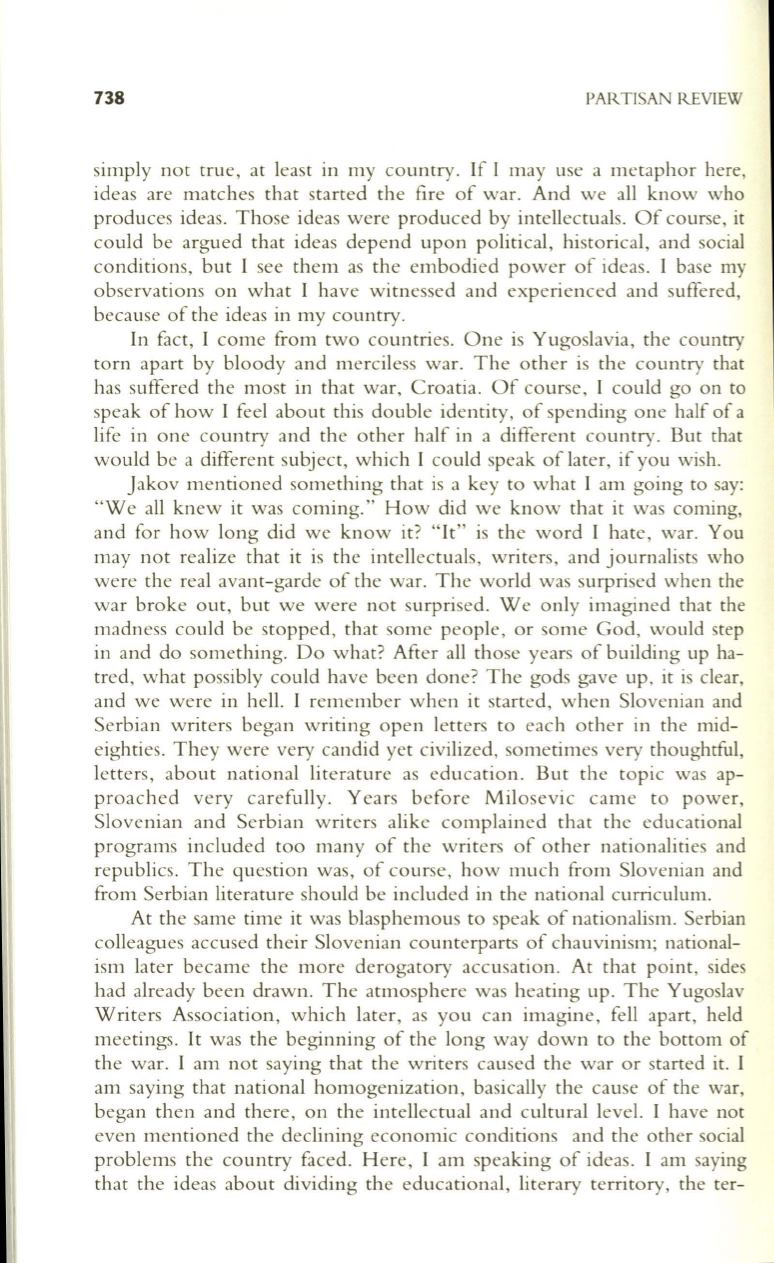
738
PARTISAN REVIEW
simply not true, at least in my country. If I may use a metaphor here,
ideas are matches that started the fire of war. And we all know who
produces ideas. Those ideas were produced by intellectuals. Of course, it
could be argued that ideas depend upon political, histori cal, and social
conditions, but I see them as the embodied power of ideas. I base my
observations on what I have witnessed and experienced and suffered,
because of the ideas in my country.
In fact, I come from two countries. One is Vugoslavia, the country
torn apart by bloody and merciless war. The other is the country that
has suffered the most in that war, Croatia. Of course, I could go on to
speak of how I feel about this double identity, of spending one half of a
life in one country and the other half in a different country. But that
would be a different subject, which I could speak of later, if you wish.
Jakov mentioned something that is a key to what I am going
to
say:
"We all knew it was coming." How did we know that it was coming,
and for how long did we know it? "It" is the word I hate , war. Vou
may not realize that it is the intellectuals, writers, and journalists who
were the real avant-garde of the war. The world was surprised when the
war broke out, but we were not surprised. We only imagined that the
madness could be stopped, that some people , or some God , would step
in and do something. Do what? After all those years of building up ha–
tred, what possibly could have been done? The gods gave up, it is clear,
and we were in hell. I remember when it started, when Slovenian and
Serbian writers began writing open letters to each other in the mid–
eighties . They were very candid yet civilized, sometimes very thoughtful,
letters, about national literature as education. But the topic was ap–
proached very carefully. Vears before Milosevic came
to
power,
Sloven ian and Serbian writers alike complained that the educational
programs included too many of the writers of other nationalities and
republics. The question was, of course, how much from Slovenian and
from Serbian literature should be included in the national curriculum.
At the same time it was blasphemous to speak of nationalism. Serbian
colleagues accused their Slovenian counterparts of chauvinism; national–
ism later became the more derogatory accusation. At that point, sides
had already been drawn. The atmosphere was heating up. The Yugoslav
Writers Association, which later, as you can imagine, fell apart, held
meetings. It was the beginning of the long way down to the bottom of
the war. I am not saying that the writers caused the war or started it. I
am saying that national homogenization, basically the cause of the war,
began then and there, on the intellectual and cultural level. I have not
even mentioned the declining economic conditions and the other social
problems the country faced. Here, I am speaking of ideas. I am saying
that the ideas about dividing the educational, literary territory, the ter-


